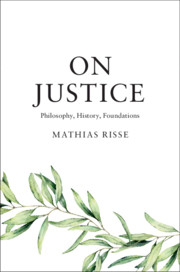Book contents
- On Justice
- On Justice
- Copyright page
- Contents
- Acknowledgments
- Introduction
- 1 Apologia for Justice
- Part I Political Philosophy
- Part II Distributive Justice
- 7 Distributive Justice and the Great Tale of Humanity
- 8 Origins
- 9 Antiquity and Beyond
- 10 Approaching the Present
- 11 Global Justice
- 12 Pluralist Internationalism
- Part III The Grounds of Justice
- Bibliography
- Index
8 - Origins
from Part II - Distributive Justice
Published online by Cambridge University Press: 18 September 2020
- On Justice
- On Justice
- Copyright page
- Contents
- Acknowledgments
- Introduction
- 1 Apologia for Justice
- Part I Political Philosophy
- Part II Distributive Justice
- 7 Distributive Justice and the Great Tale of Humanity
- 8 Origins
- 9 Antiquity and Beyond
- 10 Approaching the Present
- 11 Global Justice
- 12 Pluralist Internationalism
- Part III The Grounds of Justice
- Bibliography
- Index
Summary
Discourse about justice assesses what each person’s share in the accomplishments of humanity should be. This is a sufficiently abstract characterization to accommodate differences in usage of terms such as justice, justitia, dikaiosunê, etc. Yet it is characteristically human that we construct and maintain things together. Plato’s world is limited to city-states, but Plato gives us the idea of each doing/having their own as a core idea for determining each person’s share in common accomplishments. “To each their own” reason also plays a role in the work of al-Fārābi. But the range of interpretations of that idea becomes visible through the Nazi appropriation of the slogan. Another point of orientation is Aristotle’s distinction between distributive and corrective justice. From Cicero, finally, we get the thought that reflection on each person’s share might involve reflection on concentric circles of involvement.
- Type
- Chapter
- Information
- On JusticePhilosophy, History, Foundations, pp. 149 - 170Publisher: Cambridge University PressPrint publication year: 2020



